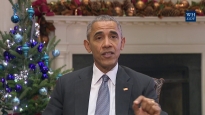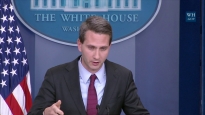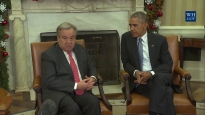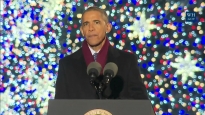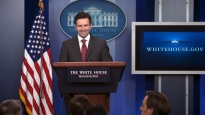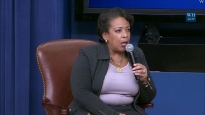The President Awards the Medal of Honor to Corporal William "Kyle" Carpenter
June 19, 2014 | 21:26 | Public Domain
President Obama awards Corporal William "Kyle" Carpenter the Medal of Honor for his courageous actions while serving in Afghanistan.
Remarks by the President at Presentation of The Medal of Honor to Corporal William Kyle Carpenter
East Room
2:33 P.M. EDT
THE PRESIDENT: Thank you, everybody. Please be seated. On behalf of Michelle and myself, welcome to the White House.
The man you see before you today, Corporal William Kyle Carpenter, should not be alive today. Hand grenades are one of the most awful weapons of war. They only weigh about a pound, but they’re packed with TNT. If one lands nearby, you have mere seconds to seek cover. When it detonates, its fragments shoot out in every direction. And even at a distance, that spray of shrapnel can inflict devastating injuries on the human body. Up close, it’s almost certain death.
But we are here because this man, this United States Marine, faced down that terrible explosive power, that unforgiving force, with his own body -- willingly and deliberately -- to protect a fellow Marine. When that grenade exploded, Kyle Carpenter’s body took the brunt of the blast. His injuries were called “catastrophic.” It seemed as if he was going to die. While being treated, he went into cardiac arrest, and three times, he flatlined. Three times, doctors brought him back.
Along with his parents, who call Kyle’s survival “our miracle,” we thank God they did. Because with that singular act of courage, Kyle, you not only saved your brother in arms, you displayed a heroism in the blink of an eye that will inspire for generations valor worthy of our nation’s highest military decoration, the Medal of Honor.
Now, Kyle and I have actually met before. During his long recovery at Walter Reed, he and some of our other wounded warriors came to the White House to celebrate the World Series champion, the St. Louis Cardinals. Some of you might be aware, I am a White Sox fan. (Laughter.) Kyle likes the Braves. So it was a tough day for both of us. (Laughter.)
But after the ceremony, Michelle and I had the chance to meet Kyle. And at the time, he was still undergoing surgeries. But he was up and he was walking, and he was working his way toward being independent again, towards the man you see here today. And, Kyle, the main message we want to send is, welcome back. We are so proud to have you here.
We just spent some time not just with Kyle, but also with his wonderful family. And anybody who has had a chance to get to know this young man knows you’re not going to get a better example of what you want in an American or a Marine. Despite all the attention, he’s still the same humble guy from Gilbert, South Carolina, population of about 600 -- I guess today it’s only population 590-something. (Laughter.)
These days he’s also at the University of South Carolina, “just a normal college student,” he says, cheering for the Gamecocks. You’ll notice that Kyle doesn’t hide his scars; he’s proud of them, and the service that they represent. And, now, he tells me this, and so I’m just quoting him -- he says, “the girls definitely like them.” (Laughter.) So he’s kind of -- he’s working an angle on this thing. (Laughter.) I wasn’t sure whether I was supposed to say that in front of mom. (Laughter.) But there’s a quote there.
In addition to our many distinguished guests, I want to welcome those who made this man the Marine that he is -- Kyle’s father, Jim; Kyle’s lovely mom, Robin; and his brothers, Price, and Peyton, one of whom is going to be joining Kyle at South Carolina, another Gamecock, and then we’ve got one who’s going to be at The Citadel. We also have Kyle’s Marine brothers who served with him in Afghanistan and through his recovery. And I also want to welcome the members of the Medal of Honor Society, whose ranks Kyle joins today.
Kyle and his fellow Marines served during the surge of forces that I ordered to Afghanistan early in my presidency. Their mission was to drive the Taliban out of their strongholds, protect the Afghan people and give them a chance to reclaim their communities.
Kyle and his platoon were in Helmand province in Marja, pushing their way across open fields and muddy canals, bearing their heavy packs even as it could heat up to 115 degrees. In one small village, they turned a dusty compound into their base. The insurgents nearby gave their answer with sniper fire, and automatic weapon fire, and rocket-propelled grenades.
That morning, Kyle said, “our alarm clock was AK-47 fire.” Some of the men were by their bunks, gearing up for another day. Some were heating up their MREs. Some were in makeshift ops centers -- a simple mud building -- planning the day’s patrols. And up on the roof, behind a circle of sandbags, two Marines manned their posts -- Kyle, and Lance Corporal Nicholas Eufrazio.
The compound started to take fire. Seeking cover, Kyle and Nick laid down low on their backs behind those sandbags. And then the grenade landed with a thud, its pin already pulled. It was about to explode.
And Kyle has no memory of what happened next. What we do know is that there on that rooftop he wasn’t just with a fellow Marine, he was with his best friend. Kyle and Nick had met in training. In Afghanistan they patrolled together, day and night, a friendship forged in fire. Kyle says about Nick, “He was my point man, and I loved him like a brother.”
When the grenade landed, other Marines in the compound looked up and saw it happen. Kyle tried to stand. He lunged forward toward that grenade, and then he disappeared into the blast. Keep in mind, at the time, Kyle was just 21 years old. But in that instant, he fulfilled those words of Scripture: “Greater love hath no man than this; that a man lay down his life for his friends.”
They found Kyle lying face down, directly over the blast area. His helmet was riddled with holes. His gear was melted. Part of his Kevlar vest was blown away. One of the doctors who treated him later said Kyle was “literally wounded from the top of his head to his feet.”
And for a moment, Kyle was still conscious. His eyes were open but he couldn’t see. Kyle remember “everything went white.” And yet, even then, his thoughts were not of himself. One of the Marines who was there remembers how Kyle kept asking one question, and that was whether Nick was okay. And then, as Kyle’s strength drained away, he sensed the end was coming. So according to Kyle’s memories, “My last thought [was to] make peace with God. I asked for forgiveness. I was trying to make the best and most of my last few seconds here on Earth.”
The Medal of Honor is presented for gallantry on the battlefield. But today, we also recognize Kyle Carpenter for his valor since in the hard fight for recovery. Eventually, Kyle woke up after five weeks in a coma. I want you to consider what Kyle has endured just to stand here today -- more than two and a half years in the hospital. Grueling rehabilitation. Brain surgery to remove shrapnel from his head. Nearly 40 surgeries to repair a collapsed lung, fractured fingers, a shattered right arm broken in more than 30 places, multiple skin grafts. He has a new prosthetic eye, a new jaw, new teeth -- and one hell of a smile. (Laughter.)
And Kyle is the first to give credit elsewhere. His doctors at Bethesda, he says, “put me back together well.” Today is also a reminder that in past wars, somebody with injuries as severe as Kyle’s probably wouldn’t have survived. So many of our wounded warriors from today’s wars are alive not just because of remarkable advances in technology, but primarily because of the extraordinary dedication and skill of our military and our VA medical professionals.
So we need to keep doing everything we can in our power to give our wounded warriors and those who treat them the support that they need. And I think this is a wonderful opportunity to ask doctors Debra Malone and Lauren Greer, and the rest of Kyle’s medical team who are here to please stand. I see their amazing work every time I visit Bethesda, every time I visited Walter Reed. It’s pretty rare where you’ve got a job where you just know you’re doing God’s work every single day. And they do an incredible job, so thank you. (Applause.) Thank you for the miracles you work for our wounded troops and veterans.
Now, Kyle says he’ll wear this medal for all who serve and for those who didn’t make it back, and for those who struggle still. So today, we also honor two members of his team who made the ultimate sacrifice in that deployment: Kyle’s friends Lance Corporal Timothy M. Jackson of Corbin, Kentucky, and Lance Corporal Dakota R. Huse of Greenwood, Louisiana.
And our thoughts are also with the Marine who Kyle saved that day, his brother, Nick. I had the opportunity to meet Nick as well nearly two years after the blast on one of my visits to Walter Reed. Nick also suffered grievous wounds. As a result of traumatic brain injury, he couldn’t speak for more than a year. He also endured multiple surgeries. Today, his recovery continues. He lives at home with his family in Plymouth, Massachusetts, where he is watching this ceremony. So, Nick, on behalf of all of us, I want you to know we honor your sacrifice as well. Your perseverance is an inspiration. And just as Kyle was there for you, our nation will be there for you and your family as you grow stronger in the years ahead.
If any of our wounded warriors seek an example -- let me amend that -- if any American seeks a model of the strength and resilience that define us as a people, including this newest 9/11 generation, I want you to consider Kyle. After everything he’s been through, he skis, he snowboards, he’s jumped from a plane -- with a parachute, thankfully. (Laughter.) He trudged through a 6-mile Mud Run, completed the Marine Corps Marathon, says he wants to do a triathlon. He’s a motivational speaker, an advocate for his fellow wounded warriors. He’s thinking about majoring in psychology so he can use his own experiences to help others. He got stellar grades. And, by the way, he’s only 24 years old, and says, “I am just getting started.”
In other words, Kyle is a shining example of what our nation needs to encourage -- these veterans who come home and then use their incredible skills and talents to keep our country strong. And we can all learn from Kyle’s example.
As we prepare for the reading of the citation, I’d like to close with his own words -- a message, I think, for every American. “It took a life-changing event to get me to truly appreciate the precious and amazing life I have been blessed with. Please take it from me, enjoy every day to the fullest, don't take life too seriously, always try to make it count, appreciate the small and simple things, be kind and help others, let the ones you love always know you love them, and when things get hard trust there is a bigger plan and that you will be stronger for it.” Pretty good message.
Corporal William Kyle Carpenter should not be alive today, but the fact that he is gives us reason to trust that there is indeed a bigger plan. So God bless you, Kyle. God bless all who serve and protect the precious and amazing life that we are blessed with. May God continue to bless and keep strong the United States of America. Semper Fi. (Applause.)
MILITARY AIDE: The President of the United States, in the name of the Congress, takes pleasure in presenting the Medal of Honor to Lance Corporal William Kyle Carpenter, United States Marine Corps, for conspicuous gallantry and intrepidity at the risk of his life above and beyond the call of duty while serving as an automatic rifleman with Company F, 2nd Battalion, 9th Marines, Regimental Combat Team One, 1st Marine Division (Forward), 1st Marine Expeditionary Force (Forward), in Helmand Province, Afghanistan in support of Operation Enduring Freedom on 21 November, 2010.
Lance Corporal Carpenter was a member of a platoon-sized coalition force comprised of two reinforced Marine rifle squads, partnered with an Afghan National Army squad. The platoon had established Patrol Base Dakota two days earlier in a small village in the Marja District in order to disrupt enemy activity and provide security for the local Afghan population.
Lance Corporal Carpenter and a fellow Marine were manning a rooftop security position on the perimeter of Patrol Base Dakota when the enemy initiated a daylight attack with hand grenades, one of which landed inside their sandbagged position. Without hesitation and with complete disregard for his own safety, Lance Corporal Carpenter moved towards the grenade in an attempt to shield his fellow Marine from the deadly blast. When the grenade detonated, his body absorbed the brunt of the blast, severely wounding him but saving the life of his fellow Marine.
By his undaunted courage, bold fighting spirit, and unwavering devotion to duty in the face of almost certain death, Lance Corporal Carpenter reflected great credit upon himself and upheld the highest traditions of the Marine Corps and the United States Naval Service.
(The Medal of Honor is presented.)
(Prayer is offered.)
THE PRESIDENT: Well, that brings us to the conclusion of this ceremony, but not the reception and party. And so I want to thank everybody again for being here, especially Kyle’s wonderful family and his parents. And I understand that the food here at the White House is pretty good -- (laughter) -- so I already told Kyle’s brothers that they should be chowing down. But that goes for everybody else as well -- and I think the drinks are free. I don’t know what -- although it’s still early in the afternoon.
Thank you very much, everybody.
END
2:51 P.M. EDT
|
December 2, 2016
|
December 2, 2016
|
December 2, 2016
|
December 1, 2016
|
|
December 1, 2016
|
November 30, 2016
|
November 30, 2016
|
November 30, 2016
|
- &lsaquo previous
- …
- 4
- 5
- 6
- 7
- 8
- 9
- 10
- 11
- 12
- …
- next &rsaquo
